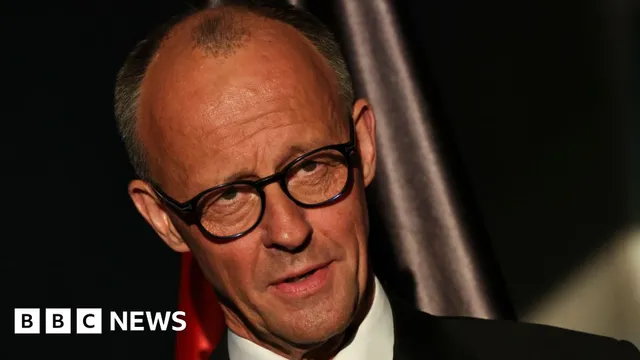
Friedrich Merz bounces back to become Germany's chancellor after chaotic vote
2025-05-07 00:32- Friedrich Merz faced a surprising defeat during the first round of parliamentary voting to become chancellor.
- His initial loss eroded confidence in his government and prompted calls for fresh elections from opposition parties.
- Ultimately, Merz rebounded in a second-round vote, but the chaotic events raised questions about the stability and future of his administration.
Express your sentiment!
Insights
In Germany, on Tuesday, Friedrich Merz, leader of the center-right Christian Democrats, emerged victorious in a second round of voting for the chancellorship after a surprising setback earlier that same day in Parliament. Merz had been anticipated to step into the role after his party finished first in the national elections in February. However, in an unexpected twist, the initial ballot saw him lacking necessary support from his coalition partners, specifically the center-left Social Democrats, leading to a postponement of his chancellorship. This incident marked the first time since the establishment of modern Germany that a chancellor candidate was unsuccessful in the first round of voting. The ramifications of the earlier defeat were felt sharply in the political landscape, with stock prices dropping and economists warning of dire consequences for Germany's economy, which was already facing stagnation amidst global challenges. Critics from opposition parties seized upon this moment to question the stability of Merz's government and called for his resignation, citing the potential negative impact on Germany’s agenda for economic growth and reforms. With economic forecast revisions and trade tensions, particularly linked to U.S. tariffs, the political environment around Merz became increasingly complicated. Prior to the parliamentary votes, Merz had initiated a controversial package on immigration reform, which drew widespread protests from citizens across the nation. This move, some analysts believe, might have contributed to diminished support during his Initial Parliamentary vote. Merz’s ability to negotiate effectively within his coalition had also come under scrutiny, as it appeared that even within his party, there was a lack of unanimous backing at such a critical moment. Despite successfully securing the chancellorship in the second round, the circumstances surrounding Merz’s rise left many observers questioning his leadership capabilities. Commentators pointed out that if he struggled to rally support from coalition peers during the voting process, significant challenges lay ahead for him in passing future legislation. As Merz embarks on a period of potential challenges including immigration policy debates and addressing a resurgent far-right political movement, his early steps in office may lead to further instability unless he can unite his coalition and reclaim voter confidence.
Contexts
The recent defeat of Friedrich Merz in the political arena has far-reaching implications for Germany's political landscape. As a leading figure in the Christian Democratic Union (CDU) and a potential chancellor candidate, Merz's loss signals a crucial turning point for the party, which has been struggling to regain its footing since its defeat in the 2021 federal elections. Merz's leadership style and political positions have often been criticized for lacking appeal among younger voters and more progressive factions, which could suggest the need for a reevaluation of the CDU's overall strategy and messaging. This defeat may compel the party to shift its focus towards more inclusive and innovative policies if it hopes to regain public trust and political relevance in the future. Merz's defeat also highlights the growing influence of leftist and environmentally focused parties in Germany, such as the Greens and the Social Democrats, which have successfully captured the attention and votes of an electorate increasingly concerned with issues like climate change, social justice, and economic inequality. The evolving voter demographics show a clear trend toward more progressive platforms, leaving conservative parties like the CDU at risk of alienating key groups such as young people, urban voters, and those who prioritize sustainability. This shift could compel the CDU to rethink its core values and policy positions to better resonate with contemporary societal values, potentially leading to a restructuring of party ideology. Furthermore, Merz's departure from the political forefront raises questions about leadership succession within the CDU. The party now faces the critical task of selecting new leadership capable of bridging internal divides and presenting a united front to voters. The next leader will need to articulate a clear vision for the CDU that aligns with modern concerns while maintaining its historical roots. This leadership transition could either open new pathways for collaboration and consensus-building within the party or exacerbate factionalism, depending on how effectively the new leader can navigate the existing power dynamics. In the context of Germany's broader political framework, Merz's defeat may also influence the coalition dynamics in both state and federal governments. As smaller parties gain power, the potential for more fragile coalition agreements increases, leading to possible gridlock on critical legislation if compromise cannot be reached. A potential reconfiguration of alliances may arise as parties negotiate their positions and priorities in the wake of these changes. Overall, Merz's defeat serves as a pivotal indicator of the shifting political atmosphere in Germany, pushing the CDU and its counterparts to adapt to new realities in order to secure their future.